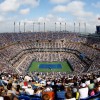By Randy Walker
@TennisPublisher
At the U.S. Open, the in-stadium entertainment on Arthur Ashe Stadium is almost as synonymous as the high-level of tennis.
The stadium is engulfed in loud music, causing fans to dance and sing while, often, images of the frolicking is shown on the huge video boards high above the stadium. Kiss cams, tennis music videos with match highlights, sponsor commercials and tennis trivia entertain the short-attention spanned fans while the players sit courtside during changeovers.
It’s part of the modern-day sports entertainment experience. But in tennis, it was not always this way and faced some strong opposition when initially instituted.
Just look back to the August 16, 1994 entry in my book and mobile app “On This Day in Tennis History” when the ATP first experimented when music on changeovers at tennis events. It didn’t go over so well, as documented below in an excerpt from the book and mobile app.
On this August 16, 1994…
Andre Agassi, the rebel tennis player who brings the “rock and roll tennis” vernacular into the sport, angrily blasts the ATP officials and organizers of the Volvo International in New Haven for instituting in-stadium music on change-overs during the pre-U.S. Open hard court tune-up event. With music blaring on change-overs, Agassi loses to No. 113-ranked Jan Siemerink of the Netherlands 6-3, 3-6, 6-3 in the feature night match of the first round in front of 10,220 fans. Agassi spends almost his entire post-match press conference ripping the ATP experiment. “It’s an embarrassment,” Agassi says. “It’s a joke. If any other tournament does this, I would quit tennis before I would go out there and be a part of that. And that’s no exaggeration. It drove me nuts…It’s not just that I was distracted by the music because any athlete has the responsibility to block out things.” Continues Agassi, “It’s a question of what they are doing to the sport. This is a sport. You come out here and you take pride in what you do. If these people aren’t here to watch tennis, they shouldn’t come at all.” Agassi complains to chair umpire Paolo Pereira about the music early in the match and calls for ATP supervisor Gayle Bradshaw to the court to express his displeasure of the musical distraction. Agassi, however, is told the music would not be turned off. Following the loss, Agassi regroups his game and form very quickly and wins the next event he plays – the U.S. Open.

